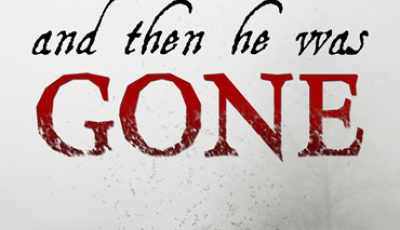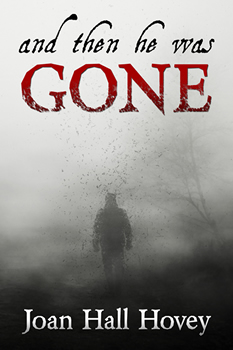

And Then He Was Gone by Joan Hall Hovey
When a man disappears, his wife is always the prime suspect. But not every woman will take that accusation lying down, as Joan Hall Hovey shows us in her new thriller, AND THEN HE WAS GONE.
The man is Adam. The woman, Julie Raynes, believes Adam has been murdered. While the police suspect she’s the culprit, Julie is determined to hunt down whoever is responsible for her husband’s death. As Hovey describes, Julie is an unlikely thriller hero.
“Most people would be drawn to Julie’s warmth and sincerity,” sh says. “She’s struggled through much pain in her life, deepening her own inherent compassionate for others. She’s generally a behind the scenes woman—enjoys her photography, works the clerical side of her husband’s woodworking business, and although she’s friendly enough, perhaps not the type to draw you out at that cocktail party.”
But in this dire situation, her courage will be tested. Julie doesn’t see herself as a heroine, but she does have a good sense of who she is and will battle if she has to, even in the midst of her terrible grief.
But what makes her think she can go after her husband’s killer?
“Her sense of justice and her love for her husband are her only qualifications,” Hovey says. “She doesn’t know if she’s capable, but she does know she has to try.”
This novel also features David Gray, a man who was pulled from a lake by a fisherman when he was nine years old and spent nearly 20 years in a coma. As it turns out, he and Adam share a dark connection, and through David we learn a lot about that villain. Hovey does great work with the tricky job of balancing the two characters.
“I’m mainly an intuitive writer,” Hovey says. “And go by my own instincts honed from years of being a voracious reader and writer. Flying without a net, so to speak. Although I do make copious notes, both on paper and cerebrally. I just know when it feels right. When it doesn’t then that’s a crazy, hair-pulling time. But there’s a certain tension that I feel in my own body when I’m on track and the story is flowing well.”
One thing that feels right in AND THEN HE WAS GONE is the way Hovey keeps the suspense simmering throughout the story. Like many great writers, she admits her books evolve in an organic way, from a deep place you can’t “think” yourself into. You must imagine.
“The suspense is crucial and I try to keep a taut thread throughout so that readers want to keep turning those pages, eager to find out what happens next,” she says.
It’s clear that Hovey loves to write about the dark side of human nature, and enjoys incorporating it into her work. Suspense writing is her forte—but she admits the genre chose her rather than the other way around.
“It’s what I most enjoy reading,” Hovey says. “We generally write best the kind of book we reach for on bookstore shelves. Or today, download. In my young life I devoured all that was suspense and horror. All the movies adapted from works by Edgar Allan Poe starring actors of the ilk of Vincent Price, Christopher Lee, Lon Chaney. Later, I discovered spine-chilling stories by the likes of Shirley Jackson, Phyllis Whitney, and so many more. I loved being scared (while safe,) lost in the pages of a book, or glued to the movie screen. I wanted to give that same thrill to others. It seemed a natural progression.
As an adult, my influences have been Stephen King, the late Ruth Rendell, and Patricia Highsmith, of the Ripley books. I didn’t think a whole lot about theme until I had written a couple of books, but I realized with the writing of my last novel, The Deepest Dark, that my books generally have to do with betrayal and abandonment, and learning to trust again. And more important, learning to trust oneself. Almost any good book will tell you something about the author herself (or himself.) You can’t avoid it.”
First and foremost, Hovey wants to give readers a roller-coaster ride, one that resonates in the imagination long after the last page is read.
And as with her previous novels, AND THEN HE WAS GONE focuses on a female protagonist. Hovey does write about men facing danger, but they are generally secondary characters, often the antagonist.
“It’s true that I focus on women,” she says. “Probably because I am a woman and know that sensibility intimately. I’m sure my books have been greatly influenced by the gothic novels that were once so prevalent, most of them written by women, and alternately called women-in-jeopardy novels.
My favorite book of all time is Jane Eyre, which is a gothic novel. I loved the atmosphere of the moors, the driving storms, the brooding nature of Mr. Rochester, but mainly Jane’s passion that even after 150 years, still rises from the pages.”
And, Hovey quickly reminds us that it’s always mainly about the characters, no matter the genre.
*****
 As well as penning suspense novels, Joan Hall Hovey’s articles and short stories have appeared in such diverse publications as The Reader, Atlantic Advocate, The Toronto Star, Mystery Scene, True Confessions, Home Life magazine, Seek and various other magazines and newspapers. Her short story, ‘Dark Reunion’ was selected for the Anthology, Investigating Women, published by Simon & Pierre, edited by David Skene-Melvin.
As well as penning suspense novels, Joan Hall Hovey’s articles and short stories have appeared in such diverse publications as The Reader, Atlantic Advocate, The Toronto Star, Mystery Scene, True Confessions, Home Life magazine, Seek and various other magazines and newspapers. Her short story, ‘Dark Reunion’ was selected for the Anthology, Investigating Women, published by Simon & Pierre, edited by David Skene-Melvin.
Joan Hall Hovey is also a writing instructor, and a Voice Over pro, narrating books and scripts. She lives in New Brunswick, Canada.
To learn more, please visit her website.
- River of Ashes by Alexandrea Weis & Lucas Astor - August 1, 2022
- Up Close: Zac Topping - June 30, 2022
- Up Close: Joey Hartstone - May 31, 2022

